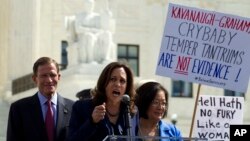Less than four weeks before U.S. congressional midterm elections, the bitter confirmation battle over Supreme Court Justice Brett Kavanaugh has galvanized activists in both major political parties. But its ultimate impact remains uncertain.
Republicans say the fight over Kavanaugh has given them a boost, especially in key Senate races in states President Donald Trump won in 2016.
Democrats counter that the Kavanaugh fallout has enraged many women voters upset with the way the Senate confirmation battle turned out, likely increasing Democratic turnout in November and threatening Republican control of the House of Representatives.
University of Virginia analyst Kyle Kondik told VOA the furor over Kavanaugh and allegations of sexual misconduct when he was a teenager, which he denied, could be “weaponized” by Republican Senate candidates looking to defeat Democratic incumbents in Republican-leaning states.
But Kondik also added that “it’s possible by time the election comes around, the Brett Kavanaugh story won’t have changed anything.” Kondik said many other trends this year favor Democrats, especially in the battle for control of the House of Representatives.
Democrats need a gain of 23 seats to retake the House and a net pickup of two seats to reclaim a majority in the Senate.
Trump rallies the base
But the Kavanaugh confirmation, as bitter and divisive as it was, was seen by many analysts as a victory for Trump. And the president is now using the hard feelings stemming from the Kavanaugh battle to rally Republican voters.
“On November 6, you will have the chance to stop the radical Democrats, and that is what they have become, by electing a Republican House and a Republican Senate,” Trump told supporters at a recent rally in Topeka, Kansas. “We will increase our majorities.”
Kavanaugh was narrowly confirmed in the Senate by a vote of 50 to 48. Following the vote, Senate Majority Leader Mitch McConnell said the party base had rallied in defense of Kavanaugh with a noticeable uptick in enthusiasm just weeks away from the midterm elections.
“What I think this has done for us is provide the kind of adrenaline shot that we had not been able to figure out how to achieve in any other way.”
Fired up Democrats
But the Kavanaugh battle has also fired up Democrats who believed the testimony of California professor Christine Blasey Ford and who wanted a more thorough investigation of the sexual misconduct allegations.
Protesters took to the streets during the Senate debate and vote, and they were cheered on by a host of Democratic senators including Elizabeth Warren of Massachusetts.
“We have lifted the voices of millions of survivors of sexual assault. We have refused to be the women who sit down and shut up.”
And other Democrats warned the intensity of the protests will spill over into the November elections.
“Let’s use this week to give us all that extra energy that we know we have to remember that the bottom line is that they may have the power right now but we need to take it back,” said Senator Kamala Harris of California. Harris and Warren are both potential presidential contenders in 2020.
Different impact
In different ways, Kondik said the Kavanaugh battle could wind up energizing both parties before the November elections.
“Maybe some of that animus remains for Republicans and that is a rallying cry for the midterm,” Kondik said. “But again, I think history would tell us, and polling data tells us, Democrats are more animated over Kavanaugh and over other things.”
While Democrats remain favorites to make gains in the House, Republicans are showing some momentum in some key Senate races in recent days.
Polls show Republicans leading in Senate races in Texas, Tennessee and North Dakota, where incumbent Democrat Heidi Heitkamp is trying to hold on in a state that went heavily for Trump in 2016.
It is not clear whether the fallout from the Kavanaugh confirmation battle is propelling the Republican momentum in these states, but a lot of party officials believe it is.
But the Kavanaugh factor could play out much differently in the battle for control of the House. Many of the most contested House races are in suburban districts where women voters will play a pivotal role, according to Jim Kessler with the center-left group Third Way.
“There is a group of voters, older women that have been a pretty good support group for Republicans, and they are starting to turn on Republicans and I think they may be the deciding factor in this election,” he said.
But for Trump, a focus on Kavanaugh could excite his base, said Gallup pollster Frank Newport.
“He looks at the numbers and sees that he is doing poorly everywhere but his base, so he decides for his own personal sanity and his own personal kind of ego sense that he says, ‘All right, I’ll just look at how well I am doing among my base and just talk to my base.’ So that is part of the reason he is doing it.”
The election may turn on whether the president’s loyal base of supporters can withstand a big turnout of opposition Democrats and independents looking to send Trump a message Nov. 6.










